| Release List | Reviews | Price Search | Shop | Newsletter | Forum | DVD Giveaways | Blu-Ray/ HD DVD | Advertise |
| Reviews & Columns |
|
Reviews DVD TV on DVD Blu-ray International DVDs Theatrical Reviews by Studio Video Games Features Collector Series DVDs Easter Egg Database Interviews DVD Talk TV DVD Talk Radio Feature Articles Columns Anime Talk DVD Savant HD Talk Horror DVDs Silent DVD
|
DVD Talk Forum |
|
|
| Resources |
|
DVD Price Search Customer Service #'s RCE Info Links |
|
Columns
|
 |
Film Noir: |
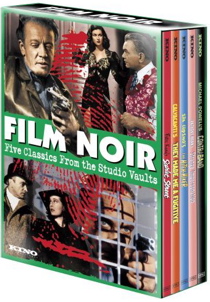
|
Film Noir: Five Classics from the Studio Vaults Scarlet Street, The Hitch-Hiker, Contraband, They Made Me a Fugitive, Strange Impersonation Kino 1940 - 1953 B&W 1:37 flat full frame Street Date November 20, 2007 49.95 |
Following the lead of Warner Bros. back in 2004, Fox, Columbia and MGM have all taken an interest in releasing titles from their libraries filmed in the style called Film Noir. The independent Kino has released plenty of B&W thrillers that are either noir or close enough to fall under that general heading. Their economical Film Noir: Five Classics from the Studio Vaults is an odd collection of entertaining titles. Only two are bona fide noirs. We also get a British espionage thriller, another very influential picture about London gangland and a weird potboiler that deals in a complicated identity swap.
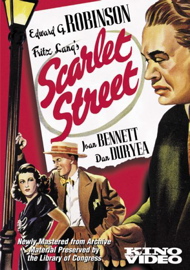
The first film up is Fritz Lang's hands-down masterpiece Scarlet Street (1945), a key noir with a fatalistic attitude undiminished by the years. Kino's disc of this terrific picture is sourced from a beautiful Library of Congress restoration and comes with an impressive array of extras including a fine commentary by David Kalat. Savant's review of the stand-alone disc is here. The film stars Edward G. Robinson, Joan Bennett and Dan Duryea and its inclusion in this set is a bargain plain and simple.
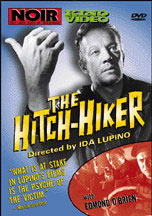
Not going in chronological order, the newest title in the box is Ida Lupino's 1953 The Hitch-Hiker, one of the pictures she made for Howard Hughes' RKO through her 'The Filmmakers' company. The taut story concerns weekend fishermen Roy Collins and Gilbert Bowen (Edmond O'Brien & Frank Lovejoy), a pair of ex- army buddies slightly bored by holding down jobs and raising families. They get more excitement than they need when they pick up Emmett Myers (William Talman of the Perry Mason TV show), a fugitive psycho who has already left a trail of dead people on the highway. Roy and Gilbert have no choice but to do the madman's bidding: he holds them at gunpoint and is too smart to trick in any ordinary way. Myers tells the pair he fully intends to kill them after he's reached his goal, and almost the entire film is a grueling exercise in suspense played out in the unsympathetic desert darkness. The two victims are jolted straight from boredom into a nightmare.
The Hitch-Hiker was written uncredited by Daniel Mainwaring to avoid Howard Hughes' personal no-hire list of liberal writers. But the big news is that the tense picture was directed by Ida Lupino, who is reportedly the only woman to direct a classic-era (1940-58) film noir. She's helped by the fine cameraman Nicholas Musuraca, who filmed Val Lewton's early hits and many another great RKO noir.
(Spoiler) The detail that haunted film-goers is Emmett Myers' paralyzed right eye. It remains open and staring even when Myers sleeps, unnerving his captives and giving him an inhuman, intimidating quality. Although the film's ironic conclusion was considered perfect when it was new, modern audiences may be disappointed that it isn't more violent. Bowen feels estranged from his wife and kids, but his marriage ends up playing a major part in his survival.
Kino's print of The Hitch-Hiker is a touch on the dark side, but it is a very low-key picture. The audio is consistently good.
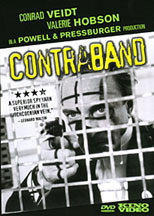
Contraband technically isn't a film noir; it isn't even an American film. It is, I believe, the second thriller on which Michael Powell and Emeric Pressburger collaborated after their exciting The Spy in Black the year before. As it's really a descendent of the Hitchcock tradition established in pictures like The 39 Steps and The Lady Vanishes, the mood is decidedly upbeat. Contraband brings back expatriate German actor Conrad Veidt, this time playing a Dutch sea captain in the time of the 'Phoney War', after Poland was invaded but before hostilities began in France. The remarkable thing about Powell & Pressburger's war movies is that they avoided simple jingoism and refused to blanket-demonize the enemy. Conrad Veidt is about as German as an actor can be, and yet he was respected and welcomed in England.
The movie is a wonderful time capsule of a nervous year in the British Isles. The Royal Navy needed to encourage whatever neutral ships would do business in English ports while shielding the country against Nazi infiltrators. Veidt's captain, himself a foreigner, discovers that his landing passes have been stolen by two passengers that may be Nazi spies. Veidt traces the saboteurs to a foggy London and enlists the beautiful Valerie Hobson to help him navigate the London streets in the blackout. Jokes abound about civilian reactions to rationing, as the impromptu couple chases the spies through a succession of restaurants to a shady below-ground hideout. Fast paced and funny, the film cemented the Powell/Pressburger partnership.
Kino has a better-than-average copy of this rarity, which for the U.S. was re-titled Blackout and trimmed by twelve minutes. It is dark and grainier in the fog scenes (which originally played in near-darkness). But I found the audio much more audible than earlier versions.
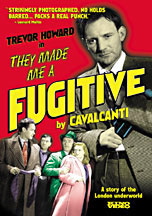
They Made Me a Fugitive was also cut radically when shown in America, shorn by a full 21 minutes. The 1947 release is one of the provocative English gangster films that prompted calls for censorship. Almost unknown over here, they were a scandal in their day: No Orchids for Miss Blandish, Cosh Boy, Brighton Rock, Good Time Girl, It Always Rains on Sunday. Some are as 'noir' as any American film, but they aren't considered in the same tradition.
They Made Me a Fugitive is the story of ex- RAF flyer Clem Morgan (Trevor Howard), who falls in with a gang of thugs run by the two-faced Narcy (Griffith Jones). When Clem finds that his smuggler pals are also in the cocaine racket, he tries to quit. Narcy then frames Clem for running over and killing a cop. Narcy changes girlfriends, dumping dancer Sally (Sally Gray, a truly hot number) for Clem's girl. Using his experience escaping from German POW camps, Clem slips out of prison and heads for London for revenge.
The movie is very violent, and for a 1947 English film, scandalously violent. Two Bobbies are shot down in cold blood, and although a police detective is a respected character the real sympathy is with Trevor Howard's vengeful hood. He fights dirty and trusts no one. The absence of establishment values surely rankled the Brit bluenoses. Before They Made Me a Fugitive is half over, we know that Clem has gone much too far to be forgiven by society.
The artsy Brazilian director (Alberto) Cavalcanti (a major contributor to Dead of Night) fills They Made Me a Fugitive with suspenseful visuals, claustrophobic sets, rainy alleys and mordant humor. The smuggler's hideout is a funeral parlor with ironic homilies on the walls ("It's later than you think") and a big sign on the roof reading simply R. I. P.. In the film's weirdest episode, a moody housewife (Vida Hope) gives the desperate Clem food and clothing. She then expects the fugitive to murder her alcoholic husband (Maurice Denham) in return. When Clem refuses, she does the job herself and tells the cops that Clem did it.
Kino's copy of this 'Alliance Films Corporation' production looks terrific, with a richly textured image and clear sound that makes the dialogue easy to follow. It makes us eager to see more post-war Cockney crime epics.

Strange Impersonation is a fun oddity, a female version of The Scar (Hollow Triumph) (or perhaps The Woman in the Window) but without an organized crime angle. It's the kind of Cornell Woolrich yarn that depends on an unlikely but entertaining twist concept. It was released by Republic pictures in 1946, among several interesting noirs (Moonrise, City that Never Sleeps, The Pretender) that don't get shown much any more. The producer is W. Lee Wilder, Billy Wilder's older brother whose career soon stalled in micro-budgeted science fiction movies like Killers from Space. Strange Impersonation is not only a competent movie, it's one of those tricky plot-driven stories that force us to stay tuned to the very end, just to find out how the darn thing resolves.
Research chemist Nora Goodrich (Brenda Marshall) puts off marrying her doctor fiancé Stephen Lindstrom (William Gargan) because she wants to complete her research on an improved anesthetic. Rather than wait for official testing approval, Nora talks her assistant Arline Cole (Hillary Brooke) into administering the drug at her home one evening. Everything goes wrong. Nora's face is burned and she barely escapes with her life. What she doesn't know is that Arline purposely started the fire to 'steal' Stephen for her own. As soon as Nora is in the hospital Arline tells terrible lies to keep Nora and Stephen apart. By the time Nora is back home she's convinced Stephen has abandoned her, while Arline has Stephen thinking he's been rejected. Fate takes a second twist when Nora gets into a fight with Jane Karaski (Ruth Ford), a bar girl tricked by a crooked lawyer's shill (George Chandler) into demanding a payoff for an accident that was Karaski's own fault. Elaborating the storyline any further than this would spoil the fun.
Strange Impersonation quickly moves into the twilight zone of identity theft and miraculous plastic surgery makeovers that only happen in movies. Hiding behind a new face and a new name, Nora returns to the hospital to learn what really happened between Arline and Stephen. As they say, the fur flies.
Lewis Herman's story can also be described as a demented Bette Davis- type tale. William Gargan's passive doctor is a definite George Brent stand-in. The beautiful Brenda Marshall, demeaned as a wooden foil for Errol Flynn in The Sea Hawk acts up a storm and develops a credible contrast between her 'before and after' appearances. And nobody's better at playing a rotten dame than Hillary Brooke, later the mother possessed by Martians in the classic Invaders from Mars -- which has some unusual similarities to this picture, plot-wise.
Director Anthony Mann would become a film noir sensation starting with T-Men and Raw Deal, also made for a minor studio. The future director of El Cid and a half-dozen landmark James Stewart westerns shows a flair for dramatic confrontations. Strange Impersonation never looks cheap even though its limited cast works in just a few sets. Not surprisingly, the underlying message implies that if professional women want to be happy, they need to stop working and marry.
Kino's Strange Impersonation transfer is also very good. It seems to come from prime elements and has a beefy soundtrack. The title sequence is an odd set of plain-lettered cards over black, as if the original titles were thrown out and a replacement had to be filmed overnight.
On a scale of Excellent, Good, Fair, and Poor,
Film Noir: Five Classics from the Studio Vaults rates:
Movies: all: Excellent
Video: Scarlet: Excellent; Hitch-Hiker: Good; Contraband: Good; Fugitive: Excellent; Strange: Excellent
Sound: all Very Good ++
Supplements: Full special edition on Scarlet Street
Packaging: Five slim cases in card sleeve
Reviewed: December 11, 2007
Reviews on the Savant main site have additional credits information and are more likely to be updated and annotated with reader input and graphics.
Review Staff | About DVD Talk | Newsletter Subscribe | Join DVD Talk Forum
Copyright © 1999-2007 DVDTalk.com All rights reserved | Privacy Policy | Terms of Use
|
| Release List | Reviews | Price Search | Shop | SUBSCRIBE | Forum | DVD Giveaways | Blu-Ray/ HD DVD | Advertise |





